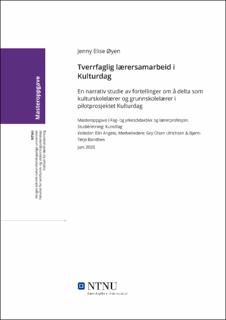| dc.description.abstract | Denne studien har undersøkt samarbeid mellom lærere i kulturskolen og lærere i grunnskolen. Hensikten med studien har vært å utvikle kunnskap om tverrfaglig samarbeid mellom kulturskole og grunnskole på lærernivå, for å forstå hvilke forståelser om tverrfaglig samarbeid, kunst og læring som møtes i et tverrfaglig lærersamarbeid i pilotprosjektet Kulturdag i Trondheim kommune. Kulturdag er et nytt samarbeidsprosjekt mellom Trondheim kommunale kulturskole (TKK) og grunnskolen i Trondheim kommune som ble innført som pilotprosjekt skoleåret 2019/2020, med det formål om å blant annet øke elevrekrutteringen til TKK. Kulturdag ved den enkelte grunnskole er lokalt tilpasset de ønsker og behov grunnskolen har, der kulturskolen prøver å møte disse behovene etter deres evne og tilgjengelige ressurser.
Det teoretiske rammeverket for studien tar utgangspunkt i Glavin og Erdals (2018) suksesskriterier og mulige hindre for tverrfaglige samarbeid i kommune-Norge. Videre blir det gjort rede for modernistiske og postmodernistiske syn på kunstdidaktikk (Aure, 2013), og kognitive, estetiske og kroppslige tilnærminger til læring (Løvlie, 1999; Merleau-Ponty, 2002/1962; Piaget, 1950). Studien plasserer seg i et hermeneutisk-fenomenologisk vitenskapssyn, og har gjennom et narrativt, sensorisk etnografisk forskningsdesign (Pink, 2015; Riessman, 2008) undersøkt hvilke fortellinger som fortelles om å delta som lærer i pilotprosjektet Kulturdag. Datamaterialet ble generert gjennom forskningsdeltakernes deltakelse på refleksjonsverksteder med samtaletegning, utfylle et refleksjonsskriv og forskerens visuelle og skriftlige logg fra feltarbeidet.
Gjennom en hermeneutisk og tematisk narrativ lesing av datamaterialet har jeg identifisert fortellinger om at kulturskolelæreren og grunnskolelæreren i begynnelsen av et samarbeid tar ansvar for områder det er forventet at den personen skal ha kompetanse på. Kulturskolelæreren tar rollen som fageksperten, mens grunnskolelæren tar rollen som eleveksperten. Videre viser studien viktigheten av å sette av tid for lærere fra kulturskolen og grunnskolen til å planlegge i felleskap og utveksle erfaringer og kompetanse. Ved å ikke sette av god nok tid til erfaringsutveksling får ikke kulturskolelæreren og grunnskolelæreren delt sine kompetanser med hverandre, eller avklart hvilken rolle Kulturdag skal ha i læreres og elevers skolehverdag. | |
| dc.description.abstract | This thesis has investigated a collaboration between teachers in the kulturskole and teachers in the elementary school. The thesis aims to develop knowledge about interdisciplinary collaboration between teachers in kulturskole and elementary school, in order to understand which different views on interdisciplinary collaboration, art, and learning meet in an interdisciplinary teacher collaboration in the pilot project Kulturdag in Trondheim municipality. Kulturdag is a new collaboration project between Trondheim kommunale kulturskole (TKK) and the elementary schools in the municipality of Trondheim, introduced as a pilot project in the school year 2019/2020, where one of the project’s aims is increasing the student recruitment to TKK. Kulturdag at each elementary school is locally adapted to the wishes and requirements of the elementary school, where the kulturskole tries to meet these needs according to their ability and available resources.
The theoretical framework of the thesis uses Glavin and Erdal's (2018) different criteria of success and barriers in interdisciplinary collaborations in municipalities of Norway. Furthermore, the thesis’ theoretical framework explains modernistic and postmodernistic views on art didactics (Aure, 2013), and cognitive, aesthetic, and embodied approaches to learning (Løvlie, 1999; Merleau-Ponty, 2002/1962; Piaget, 1950). The thesis takes on a hermeneutic-phenomenological scientific view,and investigates through a narrative and sensory ethnographic research design (Pink, 2015; Riessman, 2008), which stories are told about participating as a teacher in the pilot project Kulturdag. The thesis’ empirical material was generated through the research participants' participation in workshops with conversation-drawing, completing a reflection letter, and the researcher's visual and written log from the field work.
Through a hermeneutic and thematic narrative reading of the empirical material, I have identified stories which explain that, at the beginning of a collaboration, the teacher in kulturskole and the teacher in elementary school each take on responsibility for those areas in which they are expected to have competence. The teacher in kulturskole takes on the role of an expert in the subject matter, while the elementary school teacher takes on the role of an expert in pedagogy. Furthermore, the thesis has identified an importance in setting aside time for teachers from kulturskole and elementary school to plan and exchange experiences and competence. By not setting aside enough time for the teachers exchange of experience, the teachers from kulturskole and elementary school do not get to share their competences with each other or clarify what role Kulturdag should play in the pupils’ education. | |
